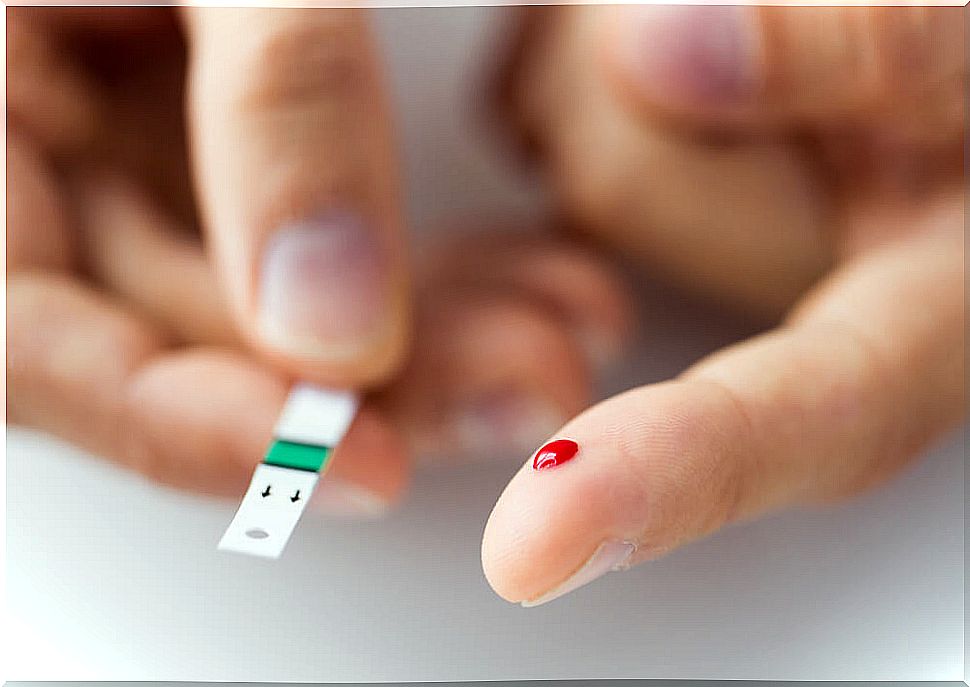High Glucose: 4 Cardinal Symptoms Of Diabetes
Hyperglycemia is a silent condition to which we must pay close attention. If it is not treated in time it can cause diabetes. Therefore, it is essential to know its symptoms, which we describe below.

Glucose (or what is commonly understood as blood sugar) is the main source of energy for the body’s cells. This type of substance is present in flour, honey, carrots, rice, among other foods.
The energy obtained allows the organs to carry out important functions of the body, such as digestion , the heart pumping, the synapse, among others.
However, in order to obtain all these benefits and be in good health, glucose must be kept between 70 and 110 mg / dl.
High glucose: hyperglycemia and diabetes
When blood sugar is above 140 mg / dl, it is called ‘hyperglycemia’. D icha condition affects various organs and may occur for two reasons :
- The pancreas has trouble producing enough insulin, the hormone responsible for regulating blood sugar. This is evidenced by a study published in the Cuban Journal of Comprehensive General Medicine.
- The body cannot use insulin properly.
On the other hand, when the blood sugar exceeds 180 mg / dl, it is called ‘diabetes mellitus’, a chronic condition that can be of two types, depending on how much the patient’s glucose level rises.
Do you have to go to the doctor?
In either case, it is essential that you visit the doctor to indicate the respective changes to apply to your lifestyle. and the type of drug treatment you should take. Everything I tell you is important, from diet to how much exercise you should do on a daily basis. Keep in mind that physical activity has been shown to be key to controlling blood sugar.

The blood glucose test is very simple and is usually very inexpensive. A small prick is enough to obtain a drop of blood and, with it, to know if the person has hyperglycemia .
The ideal is to go for a medical check-up, every 6 months , in order to monitor the changes in the body and obtain both an early diagnosis and adequate treatment.
Likewise, it is essential to acquire good life habits or improve the aspects of those that are already maintained. For example, if you already eat a balanced diet, the next step will be to know what foods to avoid, why and how to replace them. Trans fats, for example, are capable of increasing the risk of developing diabetes, as stated by research published in Diabetes & Metabolic Syndrome.
Cardinal symptoms of diabetes
If there is a history of diabetes in your family, it is important that you know what the cardinal symptoms of this condition are so that, if you notice them, you go to your doctor as soon as possible for a detailed evaluation.
1. Polydipsia

Polydipsia is the urgent and exaggerated need to drink water , usually accompanied by the sensation of having a dry mouth. It is important that you drink as much water as you require, since it is a The body’s way of seeking normalization in its glucose levels.
However, you must remember that the problem will continue until you manage to stabilize your blood sugar levels. Pa To help you, follow an appropriate exercise routine each day and follow your doctor’s instructions.
2. Polyphagia
In patients with diabetes mellitus, polyphagia is accompanied by polydipsia. ‘Polyphagia’ is the term for abnormal increase in appetite. It is understood as a desire (difficult to contain) to eat food, without reaching the satisfaction of fullness.
Polyphagia is a disorder caused by various pathologies, among which diabetes and anxiety stand out. It can be treated by controlling blood glucose values, simply with drug treatment and diet.
3. Polyuria
Polyuria occurs because the kidneys try to remove excess glucose, in their own way. Therefore, the person experiences the urge to urinate more frequently than normal. This is one of the most common symptoms of diabetes mellitus and it can be treated.
4. Weight loss
Because there are several organs affected by excess glucose in the blood, various imbalances occur in the body, such as weight loss. And it should be noted that this can occur even if the person consumes high-calorie foods.
The doctor can determine whether or not a person’s weight is healthy by using the body mass index (BMI).
See your doctor if you have symptoms of diabetes
If you have noticed that you have several of these symptoms, it is important that you clear your doubts with your doctor, who will carry out a detailed evaluation of your health and can give you a clear and correct answer. In the case of diagnosing the disease, it will be necessary to propose an effective treatment.







